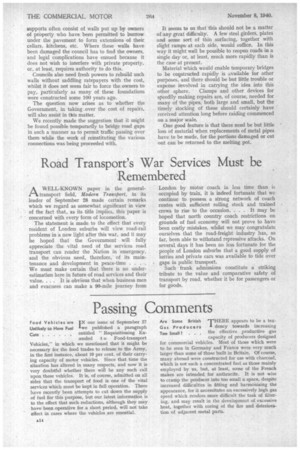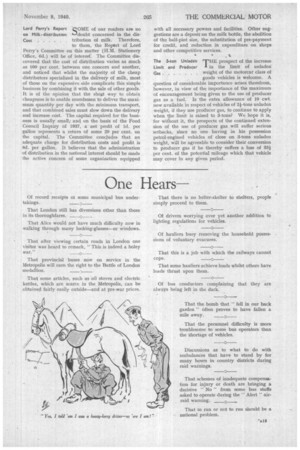Passing Comments Food Vehicles are I N our issue of
Page 16

Page 17

If you've noticed an error in this article please click here to report it so we can fix it.
September 27 Unlikely to Have Fuel we published a paragraph Cuts entitled "Requisitioning Ex
cended t o Food-transport Vehicles," in which we mentioned that it might be necessary for the food trades to release to the Army, in the first instance, about 10 per cent, of their carrying capacity of motor vehicles. Since that thine the situation has altered in many respects, and now it is very doubtful whether there will be any such call upon these vehicles. It is, of course, admitted on all sides that the transport of food is one of the vital services which must be kept in full operation. There have recently been attempts to cut down the supply of fuel for this purpose, but our latest information is to the effect that such reductions, although they may have been operative for a short period, will not take effect in cases where the vehicles are essential.
Are Some British THERE appears to be a ten.
Gas Producers dency towards increasing Too Small ? . . the effective productive gas capacity of producers designed for commercial vehicles. Most of those which were to be seen in Germany and France were very much larger than some of those built in Britain. Of course, many abroad were constructed for use with charcoal, which is not such a concentrated fuel as those mainly employed by us, but, at least, some of the French makes are intended for anthracite. It is not wise to cramp the producer into too small a space, despite increased difficulties in fitting and harmonizing the appearance, for it necessitates an excessively high gas speed which renders more difficult the task of filtering, and may result in the development of excessive heat, together with coring of the fire and deterioration of adjacent metal parts.
Lord Perry's Report COME of our readers are no on Milk-distribution ).-)doubt concerned in the dis Cost . . . . tribution of milk. Therefore, to them, the Report of Lord Perry's Committee on this matter (H.M. Stationery Office, (Id.) will be of interest-. The Committee discovered that the cost of distribution varies as much as 100 per cent. between one concern and another, and noticed that whilst the majority of the cheap distributors specialized in the delivery of milk, most of those on the expensive side complicate this simple business by combining it with the sale of other goods. It is of the opinion that the shoet way to obtain cheapness is to enable roundsmen to deliver the maximum quantity per day with the minimum transport, and that combined sales must slow down the delivery and increase cost. The capital required for the business is usually small; and on the basis of the Food Council Inquiry of 1937, a net profit of Id. per gallon represents a return of some 20 per cent. on the capital. The Committee concludes that an adequate charge for distribution costs and profit is 8d. per gallon. It believes that the administration of distribution in the national interest should be made the active concern of some organization equipped
with all necessary powers and facilities. Other suggestions are a deposit on the milk bottle, the abolition of the half-pint size, the substitution of pre-payment for credit, and reduction in expenditure on shops and other competitive services.
The 3-ton Unladen THE prospect of the increase Limit and Producer 1 in the limit of unladen
Gas weight of the motorcar class of goods vehicles is welcome. A question of considerable importance arises therefrom, however, in view of the importance of the maximum of encouragement being given to the use of producer gas as a fuel. Is the extra allowance of 10 cwt. now available in respect of vehicles of 2i-tons unladen weight, if they use producer gas, to continue to apply when the limit is raised to 3-tons? We hope it is, for without it, the prospects of the continued extension of the use of producer gas will suffer serious setbacks, since no one having in his possession petrol-engined vehicles of close on 3-tons unladen weight, will be agreeable to consider their conversion to producer gas if he thereby suffers a loss of 33i per cent. of the potential mileage which that vehicle may cover in any given period.




















































